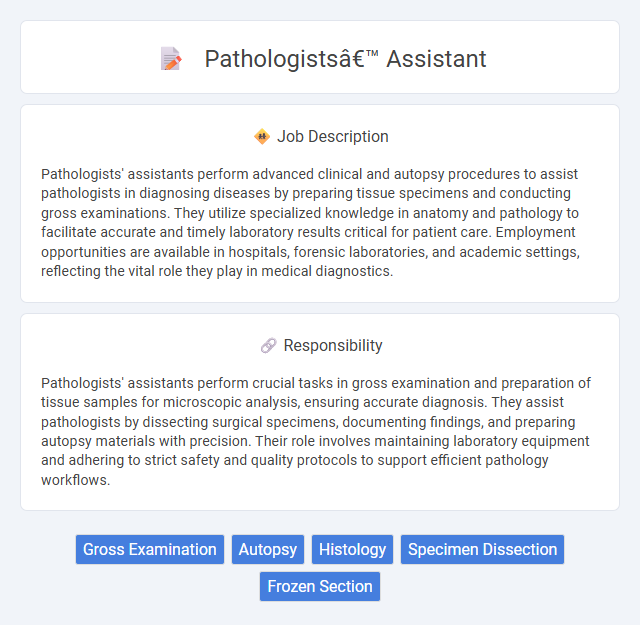
Pathologists' assistants perform advanced clinical and autopsy procedures to assist pathologists in diagnosing diseases by preparing tissue specimens and conducting gross examinations. They utilize specialized knowledge in anatomy and pathology to facilitate accurate and timely laboratory results critical for patient care. Employment opportunities are available in hospitals, forensic laboratories, and academic settings, reflecting the vital role they play in medical diagnostics.
People with strong analytical skills and attention to detail are more likely to be suitable for a pathologists' assistant role, as the job involves preparing tissue samples and assisting in autopsies. Individuals who are comfortable working with complex medical information and have a strong interest in anatomy and pathology probably find this career fulfilling. Those who prefer less physically demanding or less meticulous tasks may be less suitable for this profession.
Qualification
Pathologists' assistants typically require a master's degree from an accredited Pathologists' Assistant program, ensuring expertise in gross examination of surgical specimens and autopsies. Certification by the American Society for Clinical Pathology (ASCP) board enhances professional credibility and employment prospects. Strong knowledge of human anatomy, pathology, and laboratory techniques is essential for effective diagnostic support and specimen preparation.
Responsibility
Pathologists' assistants perform crucial tasks in gross examination and preparation of tissue samples for microscopic analysis, ensuring accurate diagnosis. They assist pathologists by dissecting surgical specimens, documenting findings, and preparing autopsy materials with precision. Their role involves maintaining laboratory equipment and adhering to strict safety and quality protocols to support efficient pathology workflows.
Benefit
Pathologists' assistants likely enhance diagnostic accuracy by preparing and examining tissue samples, which can improve patient outcomes. They may reduce the workload of pathologists, increasing efficiency within medical laboratories. Their expertise probably contributes to faster turnaround times for laboratory results, benefiting overall healthcare delivery.
Challenge
Pathologists' assistants likely encounter significant challenges in accurately preparing and examining specimens, where precision is crucial to support diagnosis. The role may demand balancing meticulous laboratory techniques with the ability to handle unexpected complexities in tissue samples. Navigating these challenges probably requires strong analytical skills and continuous learning to adapt to evolving medical standards.
Career Advancement
Pathologists' assistants play a critical role in assisting pathologists with the examination and preparation of tissue samples, providing essential support in diagnostic processes. Career advancement opportunities include specialization in areas such as forensic pathology or molecular diagnostics, as well as progression to supervisory or management positions within pathology laboratories. Obtaining certification through organizations like the American Society for Clinical Pathology (ASCP) and pursuing continued education can significantly enhance career growth prospects in this field.
Key Terms
Gross Examination
Pathologists' assistants perform detailed gross examinations by systematically inspecting, measuring, and dissecting surgical pathology specimens to ensure accurate diagnosis. They document and photograph specimens with precision, providing critical data for pathologists to make informed clinical decisions. Expertise in anatomy and pathology enables these professionals to identify abnormalities and optimize tissue sampling for microscopic evaluation.
Autopsy
Pathologists' assistants specialize in performing detailed autopsies, assisting pathologists in examining tissues and organs to determine cause of death. Their expertise includes precise dissection, sample preparation, and documentation crucial for forensic and clinical investigations. Mastery in anatomical knowledge and adherence to safety and ethical standards ensures accurate and reliable autopsy outcomes.
Histology
Pathologists' assistants specializing in histology prepare and process tissue specimens by embedding, sectioning, and staining samples for microscopic examination. They ensure the accuracy and quality of histological slides, supporting pathologists in diagnosing diseases. Proficiency in microtomy, tissue fixation, and histochemical techniques is essential for effective workflow in clinical and research laboratories.
Specimen Dissection
Pathologists' assistants perform precise specimen dissection to ensure accurate tissue sampling crucial for pathological examination. Their expertise in grossing techniques optimizes diagnostic outcomes and supports efficient laboratory workflow. Skilled handling of diverse specimens maintains tissue integrity and aids definitive disease diagnosis.
Frozen Section
Pathologists' assistants play a crucial role in performing frozen sections, which involve rapid tissue processing to provide immediate diagnostic information during surgical procedures. These specialists prepare and stain frozen tissue samples, enabling pathologists to evaluate margins and detect malignancies swiftly. Mastery in frozen section techniques enhances intraoperative decision-making, directly impacting patient outcomes in surgical oncology.
 kuljobs.com
kuljobs.com